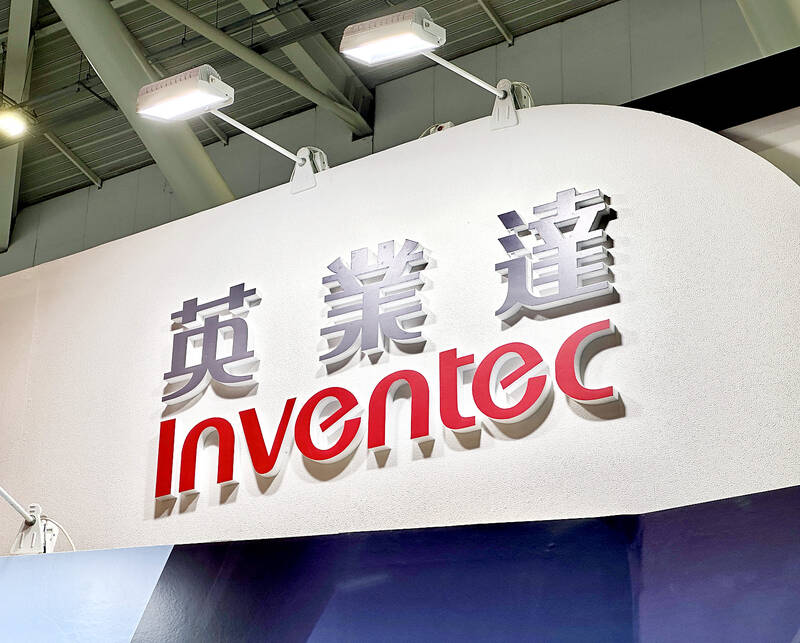Inventec Corp (英業達) on Monday forecast its revenue would grow by a single-digit percentage next year from this year amid expectations that end-market demand for notebook computers, servers and smart devices would remain robust.
The contract electronics manufacturer expects its notebook computer sales to increase by a double-digit percentage next year on the back of replacement demand and hopes to grow its artificial intelligence (AI) server sales by up to 60 percent, while its smart device business would perform slightly better than this year, it told an earnings conference.
Notebook computers accounted for 51 to 55 percent of Inventec’s revenue in the third quarter of this year, the biggest contributor ahead of servers, which accounted for about 41 to 45 percent of revenue, while smart devices provided the remaining 1 to 5 percent, the company said in an earnings statement.

Photo: Fang Wei-chieh, Taipei Times
Shipments of AI servers this year are estimated to increase to 2.5 to three times last year’s level due to relatively fewer shipments last year, accounting for 20 to 30 percent of its total revenue, the Chinese-language Liberty Times (the Taipei Times’ sister newspaper) reported yesterday, citing Inventec enterprise business group president Vincent Lin (林書如) as saying at the conference.
Next year, shipments of AI servers are expected to grow by more than 60 percent year-on-year, accounting for 30 to 40 percent of the company’s overall revenue, Lin said.
Inventec is a main assembly partner of the so-called “level 6” and “level 10” servers for Dell Technologies Inc, HP Inc and Lenovo Group Ltd (聯想).
The company expects to begin shipments of NVL36 and NVL72 server racks based on Nvidia Corp’s new GB200 processors in the first quarter of next year, it said.
Inventec’s notebook computer shipments this quarter would be higher than the same period last year, but are likely to edge down from last quarter due to earlier pull-in orders by customers in September, Inventec president Jack Tsai (蔡枝安) said at the conference.
The company forecast this quarter to be the strongest period this year for server shipments, driven by better-than-expected orders from Chinese and US vendors, while it seeks double-digit percentage growth for smart device shipments, he said.
Third-quarter net profit soared 244 percent from the previous quarter to NT$5.7 billion (US$175.79 million), the statement showed.
Net profit surged 60.27 percent year-on-year.
While revenue last quarter rose 6 percent quarterly and 21 percent annually to NT$163.82 billion, the highest on record, earnings per share were NT$0.56, missing market expectations due mainly to nonoperational expenditures of NT$646 million, which were driven by higher interest payments.
Overall, Inventec reported net profit of NT$11.5 billion in the first three quarters of this year, up 66.62 percent year-on-year, or earnings per share of NT$1.37, up 18.1 percent from the previous year.
Cumulative revenue in the first three quarters increased 16 percent to NT$448.48 billion, while gross margin rose 0.3 percentage points to 5.2 percent, the company said.

Semiconductor business between Taiwan and the US is a “win-win” model for both sides given the high level of complementarity, the government said yesterday responding to tariff threats from US President Donald Trump. Home to the world’s largest contract chipmaker, Taiwan Semiconductor Manufacturing Co (TSMC, 台積電), Taiwan is a key link in the global technology supply chain for companies such as Apple Inc and Nvidia Corp. Trump said on Monday he plans to impose tariffs on imported chips, pharmaceuticals and steel in an effort to get the producers to make them in the US. “Taiwan and the US semiconductor and other technology industries

SMALL AND EFFICIENT: The Chinese AI app’s initial success has spurred worries in the US that its tech giants’ massive AI spending needs re-evaluation, a market strategist said Chinese artificial intelligence (AI) start-up DeepSeek’s (深度求索) eponymous AI assistant rocketed to the top of Apple Inc’s iPhone download charts, stirring doubts in Silicon Valley about the strength of the US’ technological dominance. The app’s underlying AI model is widely seen as competitive with OpenAI and Meta Platforms Inc’s latest. Its claim that it cost much less to train and develop triggered share moves across Asia’s supply chain. Chinese tech firms linked to DeepSeek, such as Iflytek Co (科大訊飛), surged yesterday, while chipmaking tool makers like Advantest Corp slumped on the potential threat to demand for Nvidia Corp’s AI accelerators. US stock

The US Federal Reserve is expected to announce a pause in rate cuts on Wednesday, as policymakers look to continue tackling inflation under close and vocal scrutiny from US President Donald Trump. The Fed cut its key lending rate by a full percentage point in the final four months of last year and indicated it would move more cautiously going forward amid an uptick in inflation away from its long-term target of 2 percent. “I think they will do nothing, and I think they should do nothing,” Federal Reserve Bank of St Louis former president Jim Bullard said. “I think the

SUBSIDIES: The nominee for commerce secretary indicated the Trump administration wants to put its stamp on the plan, but not unravel it entirely US President Donald Trump’s pick to lead the agency in charge of a US$52 billion semiconductor subsidy program declined to give it unqualified support, raising questions about the disbursement of funds to companies like Intel Corp and Taiwan Semiconductor Manufacturing Co (台積電). “I can’t say that I can honor something I haven’t read,” Howard Lutnick, Trump’s nominee for commerce secretary, said of the binding CHIPS and Science Act awards in a confirmation hearing on Wednesday. “To the extent monies have been disbursed, I would commit to rigorously enforcing documents that have been signed by those companies to make sure we get